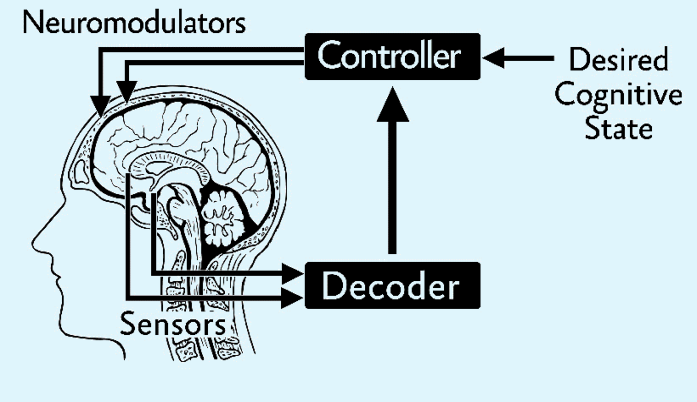Cognitive neuroscience strives to understand the neural substrates of mental processes by investigating the psychological, computational, and neuroscientific bases of cognition. With the growing number of new tools, over the last 20 years neuroengineering has advanced to allow important insights into how the brain encodes information, especially as it relates to sensorimotor processing. Much less is known about the neural mechanisms of cognitive function.
The Cognitive Neuroengineering research thrust focuses on developing better tools to understand human cognition, which can be used to develop effective treatments for cognitive deficits and improve human performance within the work environment, as well as a framework for society’s discussion of privacy, neuroethics, the role of regulatory agencies, and needed limits/restrictions on medical interventions that impact cognition.
Challenge
Treat cognitive deficits resulting from neurological and psychiatric disorders, which are difficult to treat pharmacologically.
Approaches
Develop implantable, intelligent closed-loop Brain Stimulators, to improve Attentional control, Learning & Memory, Decision-making
Basic neuroscience & computational models of cognition
Algorithms for brain dynamics identification and control
Development and testing in Nonhuman Primates
Characterization of brain pathologies in humans (Parkinson’s, epilepsy, depression, addiction, anxiety, etc.)
Testing in human neurosurgical patients (DBS, epilepsy)
Cognitive neuroengineering
Contributors
- Erie D. Boorman (Psychology, College of Letters and Science; Center for Mind and Brain; Cognitive Science Program)
- Xiaomo Chen (Neurobiology, Physiology, and Behavior, College of Biological Sciences; Center for Neuroscience)
- Jochen Ditterich (Neurobiology, Physiology, and Behavior, College of Biological Sciences; Center for Neuroscience; Cognitive Science Program)
- Joy Geng (Psychology, Cognitive Science, College of Letters and Science; Center for Mind and Brain; Cognitive Science Program)
- Richard Huskey (Communication, College of Letters and Science; Center for Mind and Brain; Cognitive Science Program)
- Wilsaan Joiner (Neurobiology, Physiology, and Behavior, College of Biological Sciences; Department of Neurology, School of Medicine)
- Sanjay Joshi (Mechanical and Aerospace Engineering, College of Engineering)
- Zhaodan Kong (Mechanical and Aerospace Engineering, College of Engineering)
- Steve Luck (Psychology, Cognitive Science, College of Letters and Science; Center for Mind and Brain; Cognitive Science Program)
- Lee Miller (Neurobiology, Physiology, and Behavior, College of Biological Sciences; Center for Mind and Brain; Cognitive Science Program)
- Karen Moxon (Biomedical Engineering, College of Engineering)
- Carolynn Patten (Physical Medicine & Rehabilitation, School of Medicine; Neurobiology, Physiology and Behavior, College of Biological Sciences)
- Charan Ranganath (Psychology, Cognitive Science, College of Letters and Science & Center for Neuroscience; Cognitive Science Program)
- Stephen Robinson (Mechanical and Aerospace Engineering, College of Engineering)
- Jonathon Schofield (Mechanical and Aerospace Engineering, College of Engineering)
- Sergey Stavisky (Neurological Surgery, School of Medicine)
- Jie Zheng (Neurological Surgery, School of Medicine; Biomedical Engineering, College of Engineering)

